
The number of permanent and fixed rate exclusions across state funded primary, secondary, and special schools has increased year on year from 2014 to 2018 in the UK. Persistent disruptive behaviour (PDA) remains the most common reason for permanent exclusions and suspensions. Other reasons include bullying, damage, physical assault and abuse. A profile of pupil exclusions in England found that pupils with a statement of Special Educational Needs (SEN) received a higher rate of permanent/fixed-term exclusions than other pupils without SEN. As pupils with SEN are 7 times more likely to receive a permanent exclusion, it is the job of an educational professional to identify and prevent the cause(s) of inappropriate behaviours in the classroom.
Some learners have social or cognitive developmental needs that make it harder to regulate their emotions and control their impulses. A pupil with autism, for instance, may be triggered by a loud noise and lash out as a way of coping with the sensory overload. A pupil with ADHD may have periods of hyperactivity when it is harder to follow instructions or participate cooperatively in a group. All children have a right to education so learning how to understand the causes of challenging behaviour will enable you to modulate triggers and cultivate positive behaviours and self-regulation skills.
This course aims to develop the knowledge, skills and practice of all education professionals working with vulnerable children and young people (CYP) displaying challenging behaviours. You will assess the Behaviour for learning policies and practices in your setting before you develop a support plan consisting of SMART goals and interventions, which you will implement and later review to determine how well it has met the learner’s developmental needs.
The course content relates to learners in compulsory education (4-18 years) with or without an EHCP. The theory, assessment and intervention strategies can be contextualised and implemented at home or in an early years setting too.
This course responds to the information needs of the whole community centred around supporting the child/young person with behaviour difficulties. Parents and carers benefit from raised awareness of their child’s needs and how to manage their behaviours. Advisory teachers, therapists and educational psychologists gain access to evidence-based CPD resources that can be used to strengthen capacity in their local authority and schools. Schools can use this course to train individuals or groups of teachers and teaching support staff as part of a school’s improvement plan or a whole-school initiative. NQTs/RQTs also build a secure knowledge of the graduated approach at the start of their career.
Our courses are structured into four sections. Click on the section headings to reveal page titles and some example content.
Learn about behaviour, its definition and influences. Understand the importance of relationships and a whole school approach to positive behaviour management and support.
- Course aims
- Section objectives
-
Who displays inappropriate behaviour?
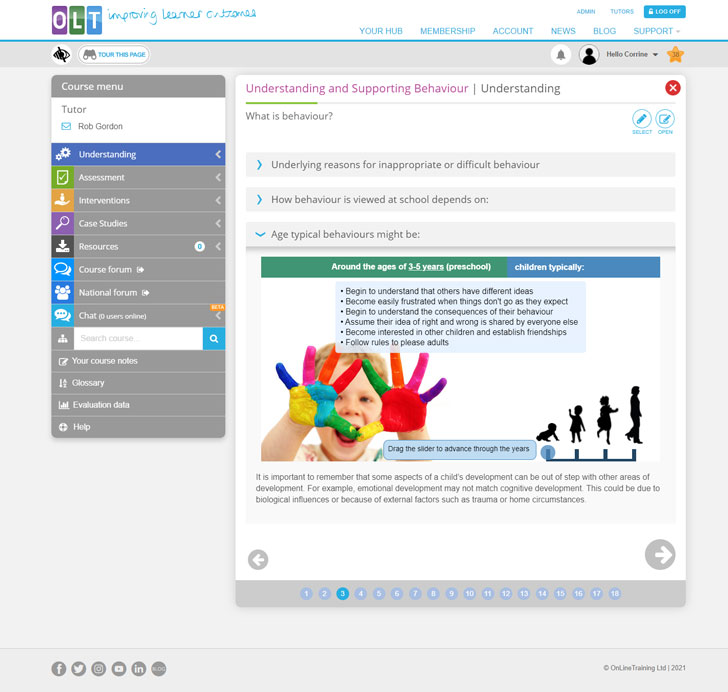
Screenshot from Understanding page 3 - Foundation theories about behaviour
- Current perspectives on behaviour
- Underlying reasons for inappropriate behaviour
- External influences on behaviour
- Internal influences on behaviour
- Relationships
-
Influential peers
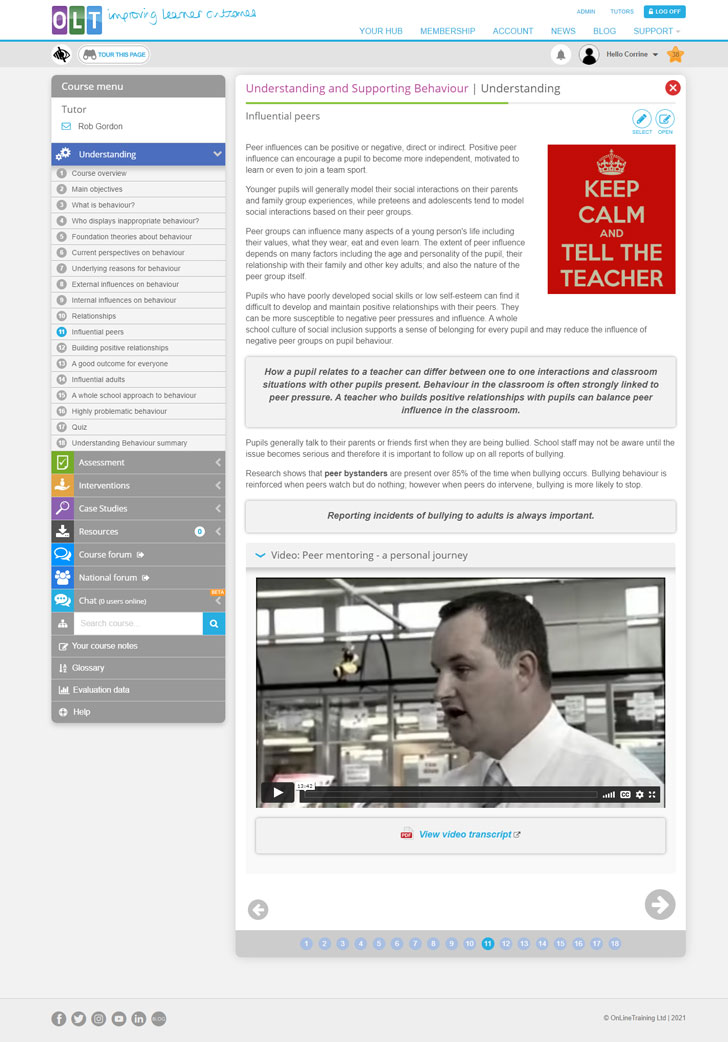
Screenshot from Understanding page 11 - Building positive relationships
- A good outcome for everyone
- Influential adults
- A whole school approach to behaviour
- Highly problematic behaviour
- End of section quiz
- Section summary
Learn how to identify and assess individual needs, recognise the influences and understand how developmental needs can lead to inappropriate behaviour.
- Section objectives and your learner profile
- Assessment considerations
- Self-reflection: your responses to inappropriate pupil behaviour
- Negative thinking and behaviour from staff
- Environmental factors outside the school
- Assessing the whole school environment
- Assessing school culture and climate
-
Assessing the classroom environment
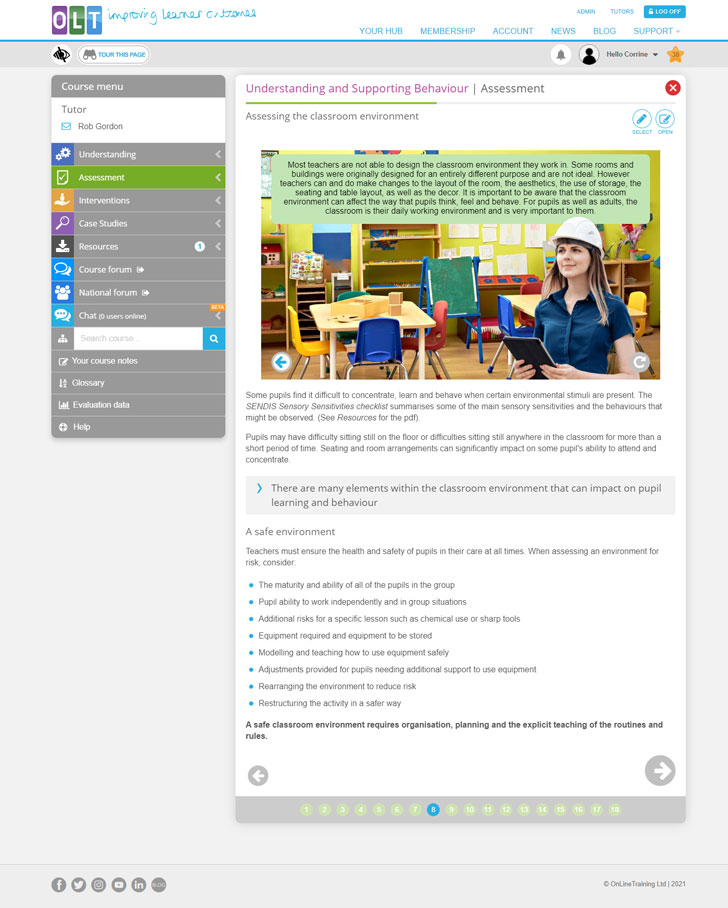
Screenshot from Assessment page 8 - Assessing the classroom climate
- Assessing pupil factors
- Observing and describing behaviour
-
A-B-C analysis
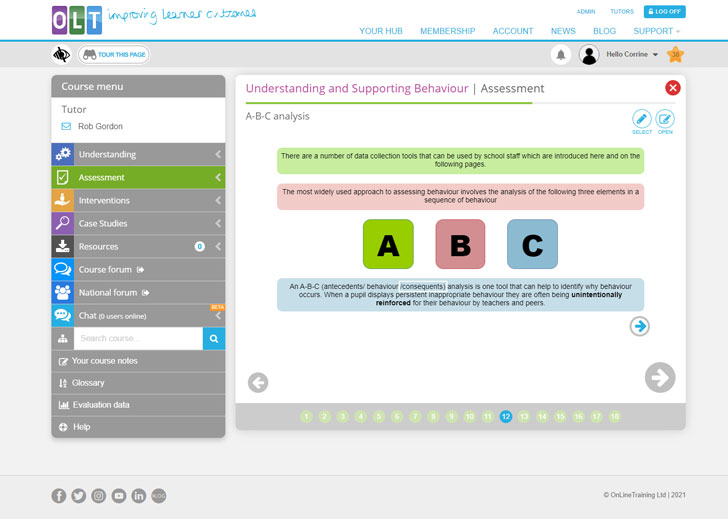
Screenshot from Assessment page 12 - Assessing the function of a behaviour
- Assessing consequents
- Assessing patterns of interaction
- Course assignment: Your Learner’s three SMART goals
- End of section quiz
- Section summary
Learn a range of strategies to support learners with behavioural difficulties.
- Section objectives
- Levels of intervention
-
Planning the environment
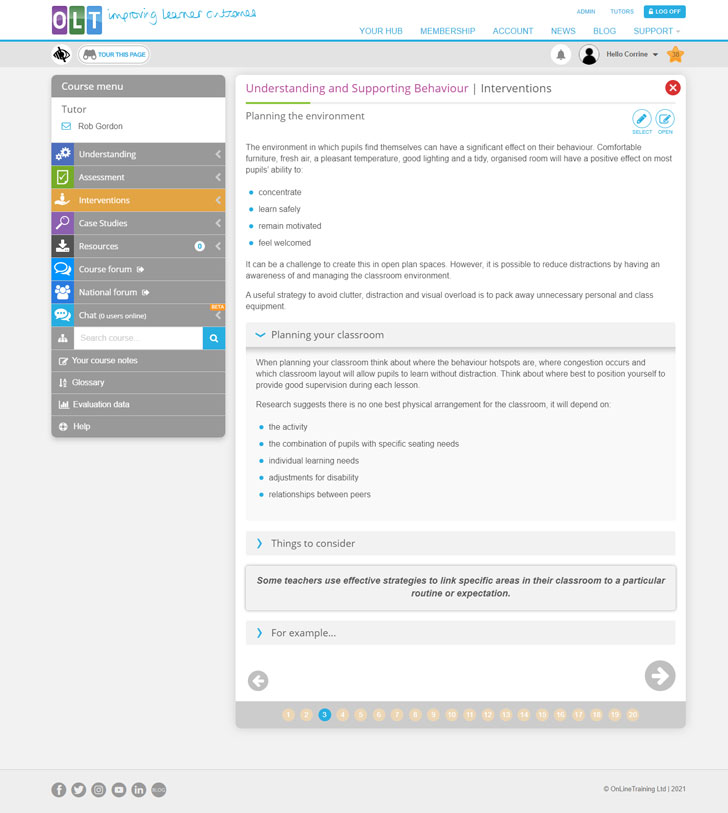
Screenshot from Interventions page 3 - Planning the environment
- Planning positive learning experiences
- Modelling consistent expectations and routines
- Using cues and prompts
- Providing praise and reinforcement
- Applying sanctions
- Building social and emotional skills
- Developing effective social skills
- Managing change, transitions and the playground
-
Teacher skills
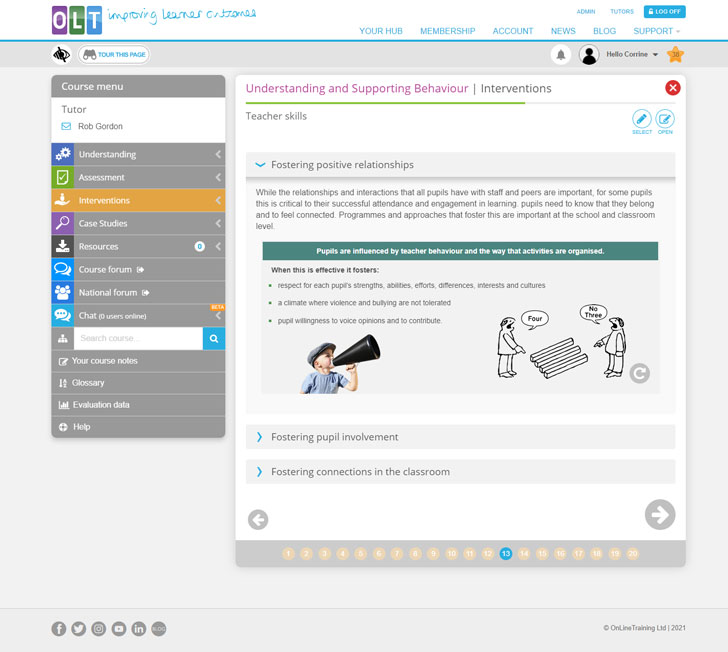
Screenshot from Interventions page 13 - Effective teacher communication
- Managing difficult behaviour
- Individual pupil interventions
- Working collaboratively
- End of section quiz
- Course assignment: Your Learner’s interventions
- Section summary
Authentic examples of behaviour interventions showing the impact on pupil progress.
- Case study: Class management
- Case study: Joanne Kellington
- Case study: Cuckmere special school
- Case study: Good advice for NQTs
- Case study: Channel 5 classroom chaos
- Case study: Self-esteem through sport initiative
- Case study: Tackling challenging behaviour
- Case study: The Horse Whisperer
- Case study: Positive behaviour
- Case study: Effective communication
- Case study: Restorative justice
Qualified Teacher
Qualified Teacher
Teaching Assistant
Qualified Teacher
Teaching Assistant
Teaching Assistant
Teaching Assistant
Teaching Assistant
Teaching Assistant
Teaching Assistant
Teaching Assistant
Course learning outcomes
On successful completion of the course, you will be able to:
- explain what makes behaviour challenging for teachers and learners
- describe how behaviour theory has shaped education practice
- reflect on your own perception/assumptions of behaviour
- describe the internal/external influences that place additional pressure on pupils
- review school learning environments to identify where improvements can be made
- use Maslow’s hierarchy of needs to assess whether pupils’ basic needs are being met
- utilise an ABC approach to assess the function of behaviour
- assess the impact of the incentives and sanctions used in your setting
- create comfortable and interesting learning environments
- employ strategies that establish ground rules, influence groups and support pupils with additional learning needs
- draw on a range of scripts and communication strategies to influence positive pupil behaviour
- create a support plan for a pupil/group of pupils in your school

